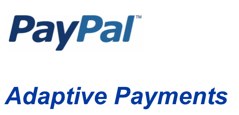
While Ebay’s Q2 earnings yesterday showed that its marketplace business was slow, the company’s revenue was boosted by continued growth in its online payments business, including PayPal and BillMeLater. Both businesses saw 11 % growth in revenue in the quarter, compared to a year ago, and saw a 20% increase in registered accounts from last year, with 75.4 million accounts. On the heels of this good news, today PayPal is officially announcing the launch of its flexible payments API, called Adaptive Payments (which we scooped a few weeks ago here). The new platform will officially open up to developers in November but will be accepting beta testers until then.
Basically the new API is designed to give developers full access to PayPal’s features, allowing them a lot more freedom in building applications which include the ability to accept and distribute payments. PayPal’s President Scott Thompson says that developers will basically be able to do anything they want off of the PayPal platform, emphasizing the “global connectivity” of PayPal (transactions can be conducted in 19 currencies). He says $2000 flows through PayPal’s system every second, 365 days a year. Thompson says that what differentiates this new innovation is the ability to maintain security, while still extending the API far from PayPal.
Very similar to Amazon’s Flexible Payments Service (FPS), the Adaptive Payments API handles payments between a sender of a payment and one or more receivers of the payment. Adaptive Payments allows almost the same functionality as FPS. The new API lets developers become a payment aggregator, which we are told is something against PayPal’s current Terms of Service. Amazon’s FPS also lets developers aggregate payments. Moreover, Paypal’s Adaptive Payments has built in micropayments support, another feature of FPS. PayPal says that they think they can be a viable micropayments vehicle, but won’t reveal more information about what the support entails.
Microsoft cloud computing platform Azure is also utilizing Adaptive Payments to let developers who are building applications using PayPal seamless integrate their applications with Azure’s platform. Microsoft is working with PayPal to help developers easily embed billing and payment functionality into applications built off Azure and will offer interoperability between Azure and Adaptive Payments.
Some of the offerings of Adaptive Payments are sure to be attractive to developers. In what PayPal calls “Chained Payments,” developers can create applications that enable a sender to send a single payment to a primary receiver who may keep part of the payment and pay other, secondary receivers with the remainder of the funds. For example, an application might be an online travel agency that handles bookings for airfare, hotel reservations, and car rentals. The sender sees only the travel site as the primary receiver. But that site could allocate the payment for its commission and the actual cost of services provided by other merchants. PayPal would deduct the money from the sender’s account and deposit it in both the primary travel site’s account and the secondary receivers’ accounts.
PayPal has decoupled the approval process from the transaction, giving sellers more flexibility of how and when sender approval process can take place. PayPal says that over the next year, they plan to unveil more APIs to encourage developer to build of the platform.
Adaptive Payments will also offer “Parallel Payments,” which would let a sender send a single payment to multiple receivers. An example of this type of application might be a shopping cart that lets a buyer pay for items from several merchants with one payment. The shopping cart would allocate the payment to the merchants who actually provided the items. PayPal would then deduct money from the sender’s account and deposits it in the receivers’ accounts. Michael Ivey, founder and CEO of TwitPay, a way to send money over Twitter, is using PayPal’s Adaptive Payments API. Off of TwitPay’s payments platform, you can pay multiple recipients in one PayPal transaction.
LiveOps, an outsourcing marketplace and platform, is using the Adaptive Payments platform for several months. The platform uses PayPal to invoice; money is dynamically routed to workers from businesses. LiveWork says the advantage of using PayPal is that there is no credit card or financial information stored on LiveWork, with security being completely outsourced to PayPal.
PayPal says that pricing for Adaptive Payments will be announced in November. It’s unclear if the plan will be competitive with Amazon’s FPS pricing. The launch of the new API and services should surely heat up the competition between PayPal and Amazon (which bought Zappos yesterday). Amazon now has Amazon Payments and the beta of FPS, which allows more flexibility for developers than PayPal’s previous Direct Payments API offering. Now, PayPal has struck back with its own flexible API and is trying to engage the developer community to freely build applications off of its platform.
PI, so it should be interesting to see where developers go.